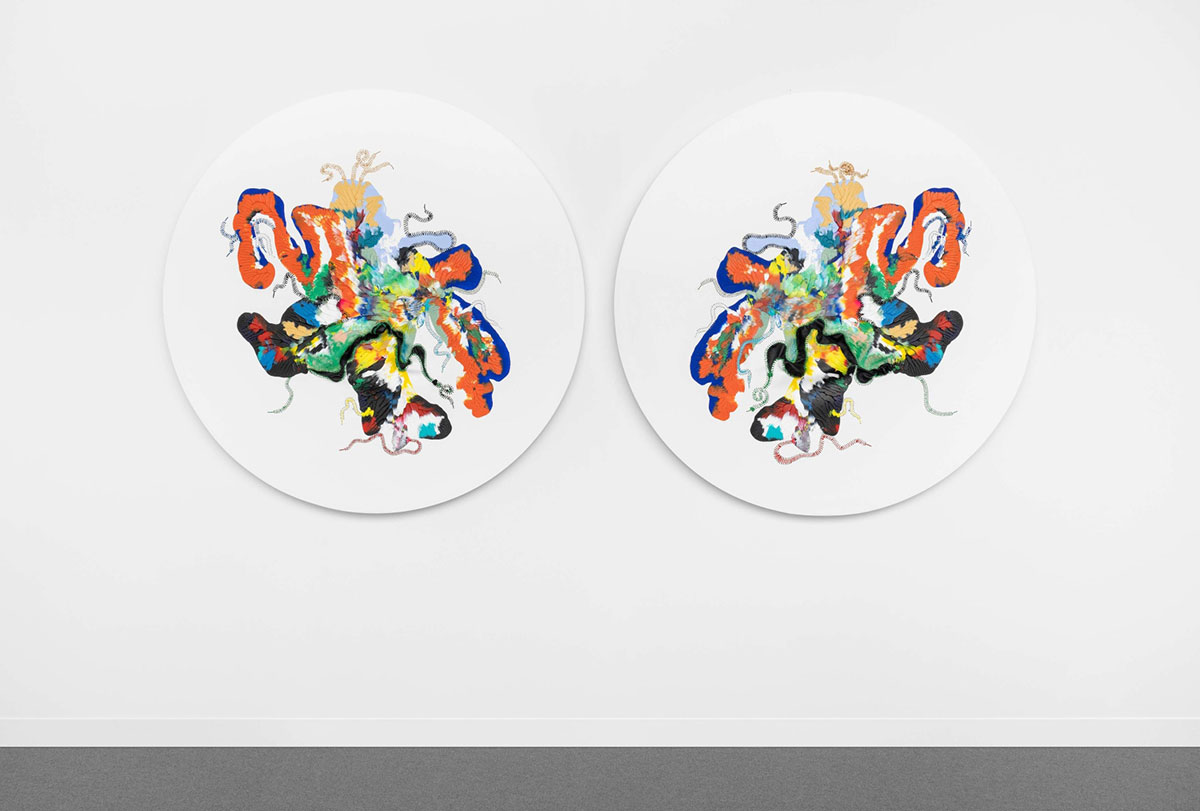PRESENTATION: SpaceRace
 The exhibition “SpaceRace” gathers five artists whose work is informed by a masterful understanding of pattern, materiality, and symbology: Leonardo Benzant, McArthur Binion, Alteronce Gumby, Nicholas Hlobo, and Brittney Leeanne Williams. The works on view, which include painting, sculpture, and mixed media, use light, color, and unexpected source materials to prompt us to contemplate our place in the universe, explore ideas of spirituality, and engage with varied perceptions of reality.
The exhibition “SpaceRace” gathers five artists whose work is informed by a masterful understanding of pattern, materiality, and symbology: Leonardo Benzant, McArthur Binion, Alteronce Gumby, Nicholas Hlobo, and Brittney Leeanne Williams. The works on view, which include painting, sculpture, and mixed media, use light, color, and unexpected source materials to prompt us to contemplate our place in the universe, explore ideas of spirituality, and engage with varied perceptions of reality.
By Efi Michalarou
Photo: Lehmann Maupin Gallery Archive
In this context, the term Space Race has a dual meaning. It is a reference to the 20th-century competition between two Cold War rivals (the United States and the Soviet Union), who sought dominance in space beyond our planet. It is also a satirical reference to the commodification of Black art in the 21st century. For example when he was alive, Jean-Michel Basquiat’s iconic art leveled a powerful opposition to inequality and racism. Since his death, his work has been co-opted, emptied of all political content, and commodified to be sold as an image of New York’s vanishing cool. Today Gap, Amazon, Urban Outfitters, Uniqlo, and Old Navy sell clothing featuring his artwork. Three different footwear companies have offered Basquiat additions in recent years. There are keychains, throw pillows, iPhone cases, scented candles, and a Basquiat edition of Uno. For the exhibition “SpaceRace” Leonardo Benzant creates structures that reflect multiple patterns and chance-operations that suggest the influence of spiritual forces behind the work and its ideas. Aesthetic principles like improvisation, polyrhythm and “call and response,” express themselves in the materiality of his work. Working with materials such as fiber, textile, and beads, Benzant transforms them into artistic expressions beyond the Western canon. Each bead, each strand, each form wrapped and bound, pulls from traditional African healing and spiritual practices. Alteronce Gumby’s vivid interstellar paintings emerge from his profound fascination with the cosmos and theories of energy. His prismatic fields add new perspectives to the history of abstract painting by proposing deliberate connections between color, society and the universe. Alteronce’s desire to interpret unknown territory is enhanced by his query into how societal conditions impact life on our planet. His practice serves as a portal into untouched worlds. It is in this context that Alteronce develops his extraterrestrial vistas. McArthur Binion creates highly personal and labor-intensive works that assert his unique position between minimalism, identity politics, and abstraction. Binion employs elemental materials such as oil stick, ink, and graphite to create a dense interlacing grid on the surface of his paintings. This hand-made geometry is applied to a ground layer of neatly tiled images—reproductions of personal photos and documents—that offer glimpses into the artist’s life: his birth certificate from Mississippi, the farm house where he was born, a passport-sized self-portrait, or an address book capturing his formative years in New York City. Highly influenced by poetry and bebop jazz, Binion swings between improvisation and order, abstraction and biography. His works refuse easy categorization, continuously shifting between a critique and an acceptance of the minimalist aesthetic, ultimately rooting the works in an individual dedication to the process of painting. Nicholas Hlobo is known for creating hybrid objects, intricately weaving ribbon and leather into crisply primed canvas alongside wood and rubber detritus. Each material holds charged associations with cultural, gendered, sexual and national identity, creating a complex visual narrative that references ideas around post apartheid nationhood and bodily healing. Using the metaphor of himself as a surgeon, Hlobo treats the canvas like a physical being, ready to be cut open and sewn up at his discretion. Guided by the subconscious, Hlobo allows the kaleidoscopic gradients of paint to conjure abstract figurative renderings on the canvas. Brittney Leeanne Williams focuses on the body as the primary subject of her pictorial investigations. Her works depict human-like forms in a state of transformation, with bodies contorted and shaped in unusual ways—figures entangled in draperies, all subject to unseen pressures or forces that extend beyond the visible. These figures twist and knot themselves into emotional compositions, enduring complex physical maneuvers to the extent that bodies, skies and landscapes merge into a transcendent fusion, where corporeal presence blends with the intangible. With a rich and deep color palette, Williams infuses an interplay between the seen and the unseen, echoing the delicate balance between the presence and absence of the body on the canvas.
Photo: Nicholas Hlobo, Uvathel’umsitho, 2023, Acrylic, leather, and ribbons on linen and cotton canvas, Diptych, each: 51.18 x 51.18 inches diameter, 130 x 130 cm, Photo: Andrea Rossetti, © Nicholas Hlobo Courtesy the artist and Lehmann Maupin Gallery
Info Curator: Dexter Wimberly, Lehmann Maupin Gallery, 1 Cromwell Place, South Kensington, London, United Kingdom, Duration: 17/1-2/3/2024, Days & Hours: Tue-Sat 10;00-18:00, www.lehmannmaupin.com/
![McArthur Binion DNA:Study/(Visual:Ear) [detail], 2022, Ink, oil paint stick, and paper on board, 72 x 48 inches, 182.9 x 121.9 cm, © McArthur Binion, Courtesy the artist and Lehmann Maupin Gallery](http://www.dreamideamachine.com/web/wp-content/uploads/2024/01/01-6.jpg)

Right: Nicholas Hlobo, Uvathel’umsitho (detail0, 2023, Acrylic, leather, and ribbons on linen and cotton canvas, Diptych, each: 51.18 x 51.18 inches diameter, 130 x 130 cm, Photo: Andrea Rossetti, © Nicholas Hlobo Courtesy the artist and Lehmann Maupin Gallery
